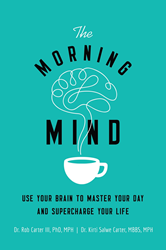
“Meditation trains the brain to be in the present moment,” says Carter “meditation is the ‘bench press’ equivalent for your brain and helps breakdown the neural connections in the brain that induce feelings of fear or anxiety.”
AUSTIN, Texas (PRWEB)
October 10, 2019
An estimated 80 to 90 percent of patients visit their doctors because of health issues that are traceable to chronic, unmanaged stress. Given recent advances in engineering and medical technology, we now know that the brain is affected by every experience, thought, emotion, and every second of stress. However, there is no magic prescription that works across the board for brain fitness. NATIONAL TRAIN THE BRAIN DAY is observed annually on October 13. What will you do TODAY to Train Your BRAIN?
“There are many different ways to train your brain and improve your cognitive skills such as mindful reading, writing, brain teasers, —along with getting enough sleep, physical activity and of course a few minutes of meditation,” says Carter, co-author with his wife, Dr. Kirti Salwe Carter, of The Morning Mind: Use Your Brain to Master Your Day and Supercharge Your Life, Amazon Bestseller & Forbes Best Self-Help. (http://www.themorningmind.com).
Carter offers 4 ways to train your brain and supercharge your life
1. Reflect On What Makes You Happy To Be Alive. “The subconscious responds very powerfully to feeling, and the more of a sensory experience you can make your ref, the more effective it will be,” says Carter “Utilize all your senses, can you see, hear, smell, touch, and taste that happy memory?”
2. Get enough shut-eye. “Sleep is an essential part of physical health,” says Carter “when we sleep, the body performs a vast array of therapeutic and healing functions that detox, repair, and heal the body and brain.”
3. Exercise your body as well as mind. “Take a 15 to 30 minute walk each morning, — or yoga, swimming, dance or do yard work if you prefer,” Carter. “ Exercise stimulates the brain plasticity by stimulating-growth of new connections between cells in a wide array of important cortical areas of the brain.” Carter says, “From a behavioral perspective, the same antidepressant-like effects associated with “runner’s high” found in humans is associated with a drop in stress hormones.”
4. Take control and train your brain with meditation.“Meditation trains the brain to be in the present moment, and to return to that focus when negative thinking and emotions intrude,” says Carter. “Meditation is the ‘bench press’ equivalent for your brain,” says Carter “meditation helps breakdown the neural connections in the brain that induce feelings of fear or anxiety.”
How much of your life do you spend in the present moment? How much time do you spend daydreaming, ruminating about the past, or worrying about the future?
Carter says offers 8 simple steps to happiness and achieving a relaxed state of mind in only five to eight minutes. 1) Sit comfortably, 2) Perform a shoulder roll, 3) Gently close your eyes, 4) Breathe in through your nose and count to four, 5) Exhale through your nose and count to four, 6) Be aware of the sensation of the breath entering the nostrils, 7. Keep attention on the breathing and when you become distracted by thoughts, do not try to stop thinking, just observe the loss of presence and return your attention to breathing, and 8) continue this exercise for five to ten minutes or until you experience a calm mind, and practice daily.
About Dr. Rob Carter III and Dr. Kirti Salwe Carter
Dr. Rob Carter III and Dr. Kirti Salwe Carter are co-authors of The Morning Mind: Use Your Brain to Master Your Day and Supercharge Your Life (http://www.themorningmind.com). Rob Carter is a Lieutenant Colonel in the U.S. Army, an expert in human performance, and has academic appointments in emergency medicine at the University of Texas Health Science Center at San Antonio, in public health at Azusa Pacific University, and in nutrition at the University of Maryland. He holds a PhD in biomedical sciences, is a Gates Scholar, and completed postgraduate studies at Harvard School of Public Health.
Kirti Carter was born in Pune, India, and received her medical education in India, where she practiced as an intensive-care physician at Breach Candy Hospital before moving to Texas to complete postgraduate training in public health. She is a Fellow of the American Institute of Stress (FAIS), has more than 18 years of experience in meditation and breathing techniques, and has been facilitating wellness seminars for the past decade.
Share article on social media or email:

